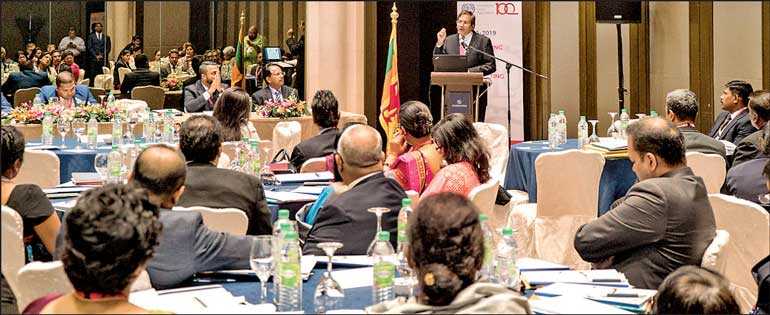Monday Apr 21, 2025
Monday Apr 21, 2025
Friday, 27 September 2019 00:00 - - {{hitsCtrl.values.hits}}


The International Labour Organisation (ILO) said recently that on average, 230,000 to 250,000 workers leave Sri Lanka annually to work overseas.
It said Sri Lanka’s diplomatic missions play a critical role in safeguarding the rights of Sri Lankans employed outside the country. In countries that employ a large number of Sri Lankans primarily in lower skilled jobs, diplomatic missions have to be equipped to swiftly provide a range of all-encompassing services – from addressing migrant worker grievances and ensuring their welfare and protection, to repatriation of distressed Sri Lankan migrant workers and assisting with initial preparation for smooth return and reintegration.
Migration for employment is a global phenomenon. Promoting decent work standards and good governance is a priority to ensure that proper labour migration processes are in place and workers are safeguarded. Therefore, it is vital that stakeholders work together to empower as well as increase protection offered to Sri Lankan migrant workers working overseas.
To support this, the ILO Country Office for Sri Lanka and Maldives in partnership with Swiss Agency for Development and Cooperation (SDC), facilitated a three-day symposium on ‘Enhancing protection and welfare for Sri Lankan migrant workers abroad’ on 18-20 September in Kuala Lumpur, Malaysia.
The symposium brought over 60 officials from 17 Sri Lankan diplomatic missions, Ministry of Foreign Employment, Ministry of Foreign Affairs and the Sri Lanka Bureau of Foreign Employment to discuss updating the Operational Manual for Labour Sections of Sri Lankan Diplomatic Missions. The operational manual, which was last updated in 2013, is a vital reference for labour attaches with detailed guidance on handling migrant worker issues and protection and promotion of their rights. The manual also covers migrant worker welfare and well-being in host countries, with special attention to country-specific arrangements.
Speaking at the event, Minister of Telecommunication, Foreign Employment and Sports Harin Fernando said, “Governments change, Ministers change, but we need one policy to guide foreign employment. At the end of the day, it is not about quantity (of migrant workers) but the quality of the migration experience and returns to the country.”
Adding to the Minister’s remarks, Ministry of Foreign Affairs Secretary Ravinatha P. Aryasinha urged Sri Lankans to “walk the talk as one country in protecting the rights and welfare of migrant workers”.
With the developments in labour migration that have taken place, the operational manual is to be further revised to strengthen the grievance handling process with new and improved procedures and guidelines for handling migrant worker issues related to the protection and promotion of their rights, welfare, and wellbeing in host countries right from the beginning of the migration cycle. The revised edition of the manual will also focus on recruitment-order processing, validating foreign recruitment agents, ensuring support services are gender sensitive and preventive measures on sexual and gender-based violence.
“This symposium is a part of the ILO’s larger engagement with the Government of Sri Lanka and our social partners on promoting safe and regular migration. Improving policies and legal frameworks, and cross-sectional interventions that protect and promote the welfare of migrant workers and their families, especially those vulnerable in low-skilled occupations and women migrant workers, is a priority for the ILO and our constituents under our Decent Work Country Programme,” highlighted ILO’s Country Director for Sri Lanka and Maldives Simrin Singh.
The symposium also discussed challenges faced by Sri Lankan diplomatic missions during the grievance handling process of migrant workers and facilitated training and capacity building on preventing sexual and gender-based violence, human trafficking and forced labour.
Since December 2011, the ILO has been supporting the implementation of priority areas of Sri Lanka’s National Labour Migration Policy (NLMP) in collaboration with the Ministry of Foreign Employment (MFE), Sri Lanka Bureau of Foreign Employment (SLBFE) and stakeholders with funding from the Swiss Agency for Development and Corporation (SDC).
Discover Kapruka, the leading online shopping platform in Sri Lanka, where you can conveniently send Gifts and Flowers to your loved ones for any event including Valentine ’s Day. Explore a wide range of popular Shopping Categories on Kapruka, including Toys, Groceries, Electronics, Birthday Cakes, Fruits, Chocolates, Flower Bouquets, Clothing, Watches, Lingerie, Gift Sets and Jewellery. Also if you’re interested in selling with Kapruka, Partner Central by Kapruka is the best solution to start with. Moreover, through Kapruka Global Shop, you can also enjoy the convenience of purchasing products from renowned platforms like Amazon and eBay and have them delivered to Sri Lanka.
Discover Kapruka, the leading online shopping platform in Sri Lanka, where you can conveniently send Gifts and Flowers to your loved ones for any event including Valentine ’s Day. Explore a wide range of popular Shopping Categories on Kapruka, including Toys, Groceries, Electronics, Birthday Cakes, Fruits, Chocolates, Flower Bouquets, Clothing, Watches, Lingerie, Gift Sets and Jewellery. Also if you’re interested in selling with Kapruka, Partner Central by Kapruka is the best solution to start with. Moreover, through Kapruka Global Shop, you can also enjoy the convenience of purchasing products from renowned platforms like Amazon and eBay and have them delivered to Sri Lanka.